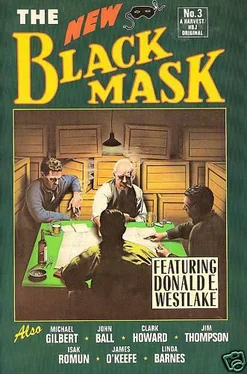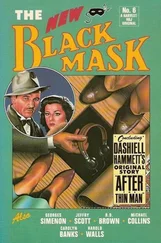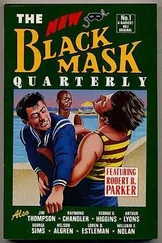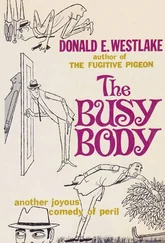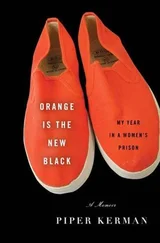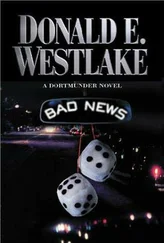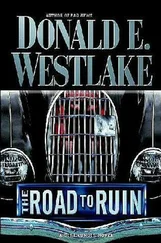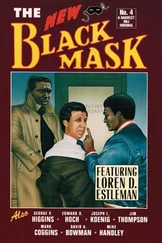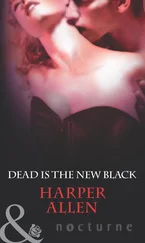Donald Westlake - The New Black Mask ( No 3 )
Здесь есть возможность читать онлайн «Donald Westlake - The New Black Mask ( No 3 )» весь текст электронной книги совершенно бесплатно (целиком полную версию без сокращений). В некоторых случаях можно слушать аудио, скачать через торрент в формате fb2 и присутствует краткое содержание. Год выпуска: 1985, ISBN: 1985, Издательство: A Harvest/HBJ Book Harcourt Brace Jovanovich, Жанр: Детектив, на английском языке. Описание произведения, (предисловие) а так же отзывы посетителей доступны на портале библиотеки ЛибКат.
- Название:The New Black Mask ( No 3 )
- Автор:
- Издательство:A Harvest/HBJ Book Harcourt Brace Jovanovich
- Жанр:
- Год:1985
- ISBN:978-0-15-665481-4
- Рейтинг книги:5 / 5. Голосов: 1
-
Избранное:Добавить в избранное
- Отзывы:
-
Ваша оценка:
- 100
- 1
- 2
- 3
- 4
- 5
The New Black Mask ( No 3 ): краткое содержание, описание и аннотация
Предлагаем к чтению аннотацию, описание, краткое содержание или предисловие (зависит от того, что написал сам автор книги «The New Black Mask ( No 3 )»). Если вы не нашли необходимую информацию о книге — напишите в комментариях, мы постараемся отыскать её.
The New Black Mask ( No 3 ) — читать онлайн бесплатно полную книгу (весь текст) целиком
Ниже представлен текст книги, разбитый по страницам. Система сохранения места последней прочитанной страницы, позволяет с удобством читать онлайн бесплатно книгу «The New Black Mask ( No 3 )», без необходимости каждый раз заново искать на чём Вы остановились. Поставьте закладку, и сможете в любой момент перейти на страницу, на которой закончили чтение.
Интервал:
Закладка:
“Just those four packets,” said Laurel.
“Some encouragement was necessary,” said Hardy.
Andrew had no eyes for them. Marie-Claude was there. He could read nothing from the expression on her face, but he thought she nodded fractionally.
Maybe it was his eyes playing tricks.
“I think,” said the black-haired man, “that we might finish—”
He broke off what he was saying as there was a squeal of tyres, and a car, driven fast, swung into the courtyard and braked. There was interest but no alarm shown by the three men in the room. Some signal must have passed. This was reinforcements, not enemies.
When the door opened and Louis Rocaire came in Andrew felt unsurprised. Louis walked over, and put an arm round his daughter.
“She is safe,” said the black-haired man. “Everything is now in order. As I was saying, I think we might finish up our business and restore this house to its owners. It is a pity about the blood. Maybe we should buy him a new carpet.”
Marie-Claude had disengaged herself from her father. She was fumbling in her handbag. Andrew knew what was going to happen, and cringed.
He said, “Please don’t do it. One against three. It is hopeless.” This was in a whisper, to himself. If some sort of diversion could be arranged—
The diversion arranged itself. The inner door of the room burst open and a man who must have been posted as a lookout on the far side of the house came in.
He said, speaking so hoarsely in his excitement that the sense of his words could hardly be made out, “Army helicopters — and police in cars.”
Marie-Claude’s hand came out, holding the small gun. She took careful aim at the black-haired man. Andrew thought that she meant to hold him up until the police arrived. Instead she pulled the trigger.
The shot hit the black-haired man in the middle of the face. Before he had dropped, the sailor had shot Marie-Claude.
After these two shots there was a full five seconds of stunned immobility. Then Louis put his hand inside his coat and drew the heavy police special.388 automatic from its shoulder holster, and started to shoot. It was a gun intended to immobilise and to kill.
His first shot slammed the sailor against the wall. The second missed the thin man who had twisted and drawn his own gun. Before he could use it, Louis’s third shot tore off his right arm. It was the lookout, standing in the open doorway, who shot Louis before taking to his heels.
Andrew was flat on his face behind the sofa.
“A clean sweep,” said Colonel Foxwell. It was three days later. He and Andrew were alone in the headquarters office of the Anglo-French Narcotics Liaison Section in Paris. “Excellent.”
“Excellent” was his highest commendation for any operation.
He added, “A pity about the girl.”
Clark Howard
Breaking Even
In thirty years as a writer, Clark Howard has published twelve novels, four nonfiction books about crime, and 232 stories. He won an Edgar Allan Poe Award of the Mystery Writers of America for his New Orleans Dixieland story, “Horn Man ” in 1982 and has been nominated for five other Edgars.
Dewey Taylor arrived in New Rome, Alabama, just before noon on the last day of the Jack Strawn murder trial. He drove to New Rome’s only motel, the Overnighter (Color TV, Room Phones, Free Ice), and checked into the room that Grover, the city editor, had reserved by phone from Birmingham that morning. When he got his key, he also picked up a message to call Fred Simply, the paper’s New Rome stringer, who had been covering the trial during the two weeks since it started. In his room, with a plastic bucket of free ice to go with the bottle of Gordon’s gin in his garment bag, he called the stringer.
“Is your name really ‘Simply?” he asked. “Or did you make it up?”
“Uh, no, sir, it’s really ‘Simply,’ ” Simply said. “Uh, why, sir?”
“Just curious,” Taylor said vaguely. “Okay, what’s the line on the Strawn trial?”
“Jury’s still out,” the stringer said. “We’re waiting to see if they reach a verdict before lunch.”
“They won’t,” Dewey Taylor assured him.
“Uh, why not?”
“Because the lunch is free. They’ll reach a verdict after lunch.”
“Oh.”
“Now, listen, Simply, I have some important work to do here in my room. I want you to stay there at the courthouse and call me the minute the jury is ready with a verdict. Got that?”
“Uh, yessir, Mr. Taylor. Will do.”
Dewey hung up, shaking his head. Will do. Roger. V-for-Victory. Over and out. He grunted softly and rubbed a stiff place in his forty-year-old back. Youth, he thought. Always such confidence. Fred Simply wouldn’t be so eager in fifteen or twenty years, after he’d slipped down the ladder a few times.
Dewey took a long swallow of Gordon’s over ice, and stretched out on the bed to take a nap.
Twenty minutes after they got back from lunch, the Strawn jury sent word to the judge that they had reached a verdict. Fred Simply called Dewey and the reporter got over to the courthouse just as the bailiff was bringing the panel back into the courtroom.
“Good work, Simply,” Dewey said, slapping the stringer on the back. He had learned long ago to always slap stringers on the back. And wink at them confidentially. It made them feel like one of the boys. A real reporter. Fred “Scoop” Simply.
“Uh, Mr. Taylor, the assistant city editor said I should talk to you about getting a byline for myself. So far, all they’ve tagged my stories with is ‘From the Herald’s New Rome Correspondent.’ The assistant city editor said that since it’s your story, the byline credit is up to you.”
“Later, Simply,” said Taylor. “Right now I’ve got to study the faces of the jurors. You know, for color and human interest.” Dewey turned to the jury with feigned interest.
There were seven women and five men on the panel. Three of the men looked like farmers who were worrying more about their untended fields than whether to send Jack Strawn to Alabama’s electric chair. Most of the women looked like housewives, except for two who might have been employed at the local Levi Strauss factory, and whose glum expressions stated that they were acutely aware of the difference between the four dollars per hour they earned on the stitching line, and the six dollars per day the county paid them for jury duty. Dewey had been covering murder trials for fifteen years; he never failed to wonder how much personal economics had to do with sending people to the electric chair or the gas chamber.
Looking over at the defendant, Dewey saw that Jack Strawn had not changed much in the ten years since Dewey had last seen him. He was still broad-shouldered, trim-waisted, had a head full of thick, curly hair, obviously still the macho man he had always been. And apparently had the same temper, too, Dewey thought, seeing as how he was charged with murdering his employer with an ice pick.
The sounding of the judge’s gavel interrupted Dewey’s thoughts. “The clerk will read the jury’s verdict,” the judge instructed.
The clerk faced Jack Strawn and read, “We, the jury, find the defendant, Jack James Strawn, guilty of murder. We further find that it is murder in the first degree, and we fix his punishment at death.”
At the defense table, Strawn turned pale, shook his head in disbelief, and buried his face in his hands. From the front row of the spectator section, Dewey stared at him, thinking, You used that ice pick once too often, didn’t you, macho man?
Dewey’s thoughts went back to a decade earlier when he had covered another murder trial in which Jack Strawn had been the defendant. That trial, in Birmingham, had been for the ice pick murder of Strawn’s young wife. The prosecution had not been able to find the murder weapon, and there had been just enough reasonable doubt to allow Strawn to go free.
Читать дальшеИнтервал:
Закладка:
Похожие книги на «The New Black Mask ( No 3 )»
Представляем Вашему вниманию похожие книги на «The New Black Mask ( No 3 )» списком для выбора. Мы отобрали схожую по названию и смыслу литературу в надежде предоставить читателям больше вариантов отыскать новые, интересные, ещё непрочитанные произведения.
Обсуждение, отзывы о книге «The New Black Mask ( No 3 )» и просто собственные мнения читателей. Оставьте ваши комментарии, напишите, что Вы думаете о произведении, его смысле или главных героях. Укажите что конкретно понравилось, а что нет, и почему Вы так считаете.
